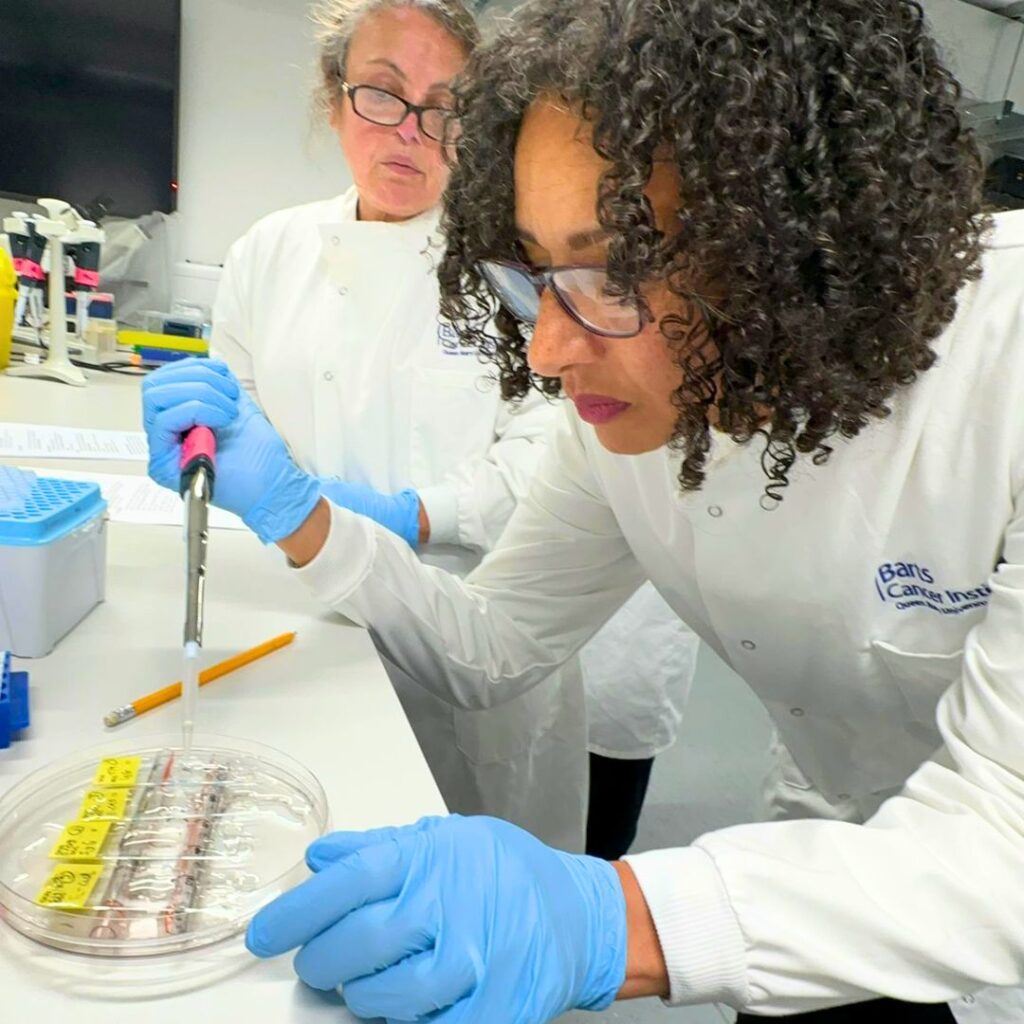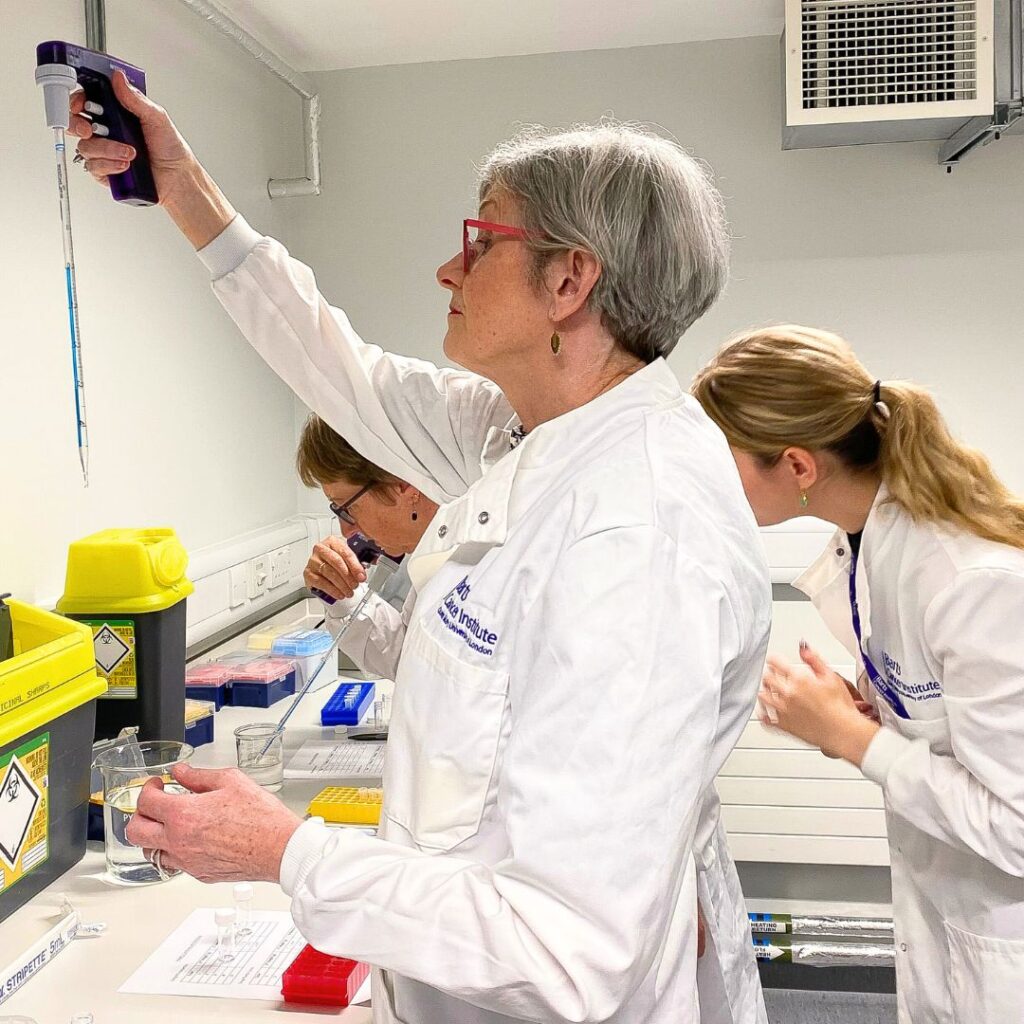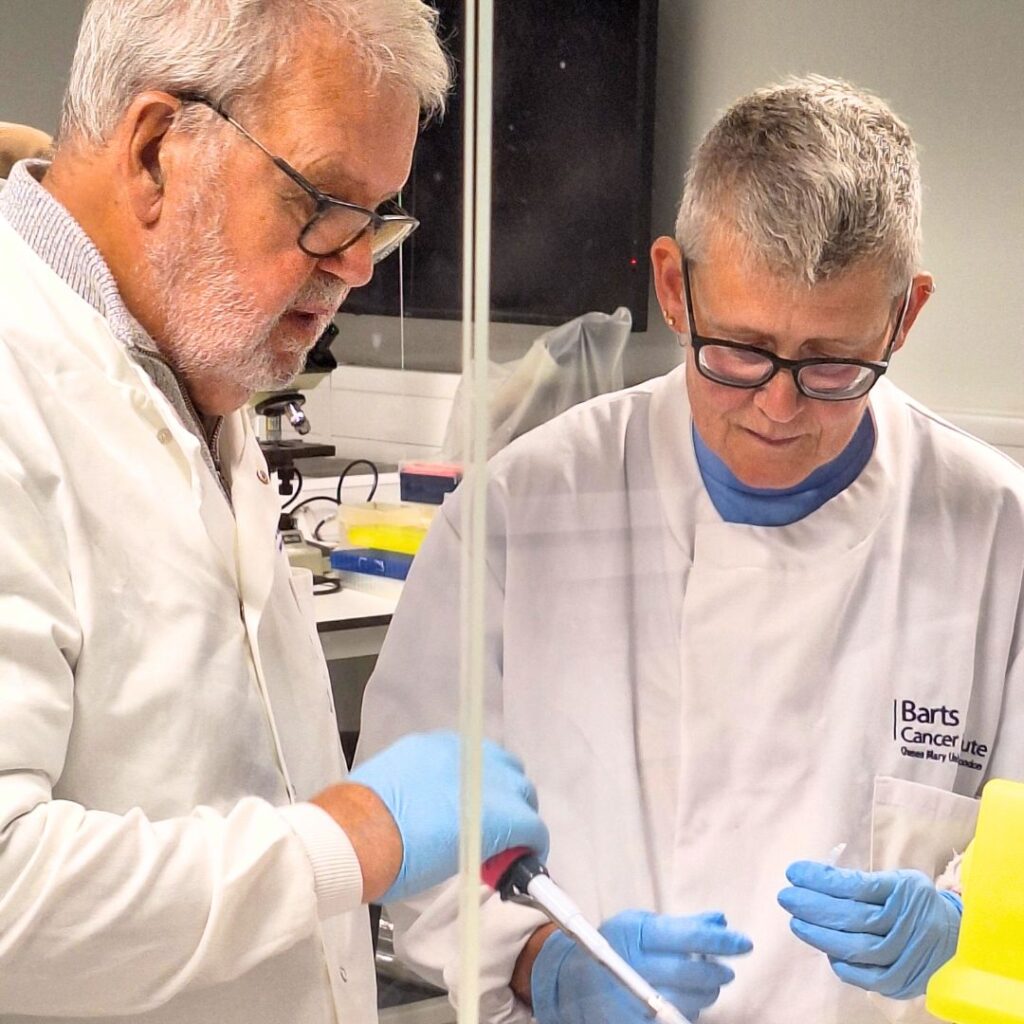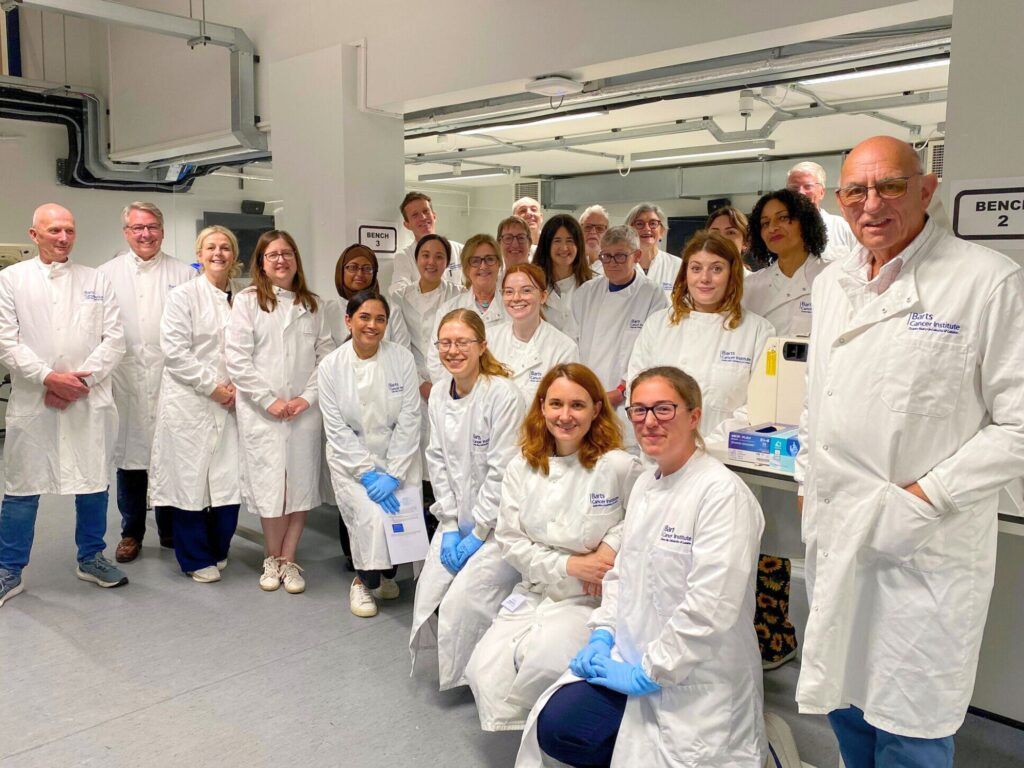Helping cancer patient advocates find their voice
Barts Cancer Institute recently welcomed a group of 16 cancer patient advocates into our labs for the 11th edition of our VOICE science for advocates course, co-run with the charity Independent Cancer Patients' Voice.
Patient advocates play a crucial role in putting patients' perspectives at the centre of cancer research. By participating in funding, ethics and policy committees, they help to improve cancer research and maximise its benefit to patients.
VOICE is the first and currently only patient advocate scheme of its kind in the UK. Participants receive tuition in cancer biology from leading researchers at the BCI and gain hands-on experience in the laboratory. This experience helps them to raise their confidence in discussions around research.
Here, five of this year’s participants share their stories and reflect on how VOICE will impact their advocacy work moving forward.
Faaria's story
My name is Faaria, and I’m a person living with cancer. Last year, I saw a recruitment call for Cancer Research UK’s insights panel. It featured a woman who shared her story and explained why she got involved. Seeing someone who looked like me made me think: “I could do that.” Since then, I’ve volunteered for Cancer Research UK in various patient advocacy roles, and I was recently appointed as a public committee member for the National Institute of Health and Social Care Research. As my advocacy work has expanded, I’ve taken on more responsibilities including reviewing scientific research papers. To support me in contributing to these discussions, Cancer Research UK nominated and funded me to take the VOICE course.
The lectures have been absolutely amazing. The time in the labs has been incredible. What we've seen through microscopes: mind-blowing. The things we've heard: stratospheric! But the most valuable thing this week has been finding my voice. Communicating with other participants, learning how valuable patient advocacy is to the research team and feeling my confidence grow: that has been empowering.

Going forward, I want to make sure I stay grounded and listen to the people I am representing to ensure I do them justice. I’m going to take away a more confident version of myself. When I’m sitting on a panel, I’ll know that I have the right to be there and that my opinion matters, and I will feel enabled to make sure I’m heard.
Ann's story
My name is Ann, and I’m from Belfast in Northern Ireland. I have stage four metastatic breast cancer, which is incurable but treatable, with an average life expectancy of two to five years. I am on both anti-HER2+ targeted therapy and endocrine therapy, and have three-monthly scans to monitor if these treatments are effective.
At the moment, I’m living well, and while that’s the case I want to use my time to drive positive change through my patient advocacy work. I work hard and am eager to see improvements made during my lifetime.
I’m a member of the Northern Ireland Cancer Research Consumer Forum, which aims to increase personal and public involvement in cancer research in Northern Ireland. Health care is devolved to the Northern Ireland Executive, and unfortunately, we are sometimes overlooked or left behind when improvements are introduced. I wanted to attend the VOICE course to help remedy that and ensure Northern Ireland is represented in discussions at the forefront of cancer research and care.

The highlight of the VOICE course was listening to world-leading researchers and feeling a sense of hope and optimism about the progress being made. Great strides have been made in the past years. When I was first diagnosed, there were just two targeted treatments available for my cancer sub-type and I knew treatment options were limited as my disease progressed. But in the four years since my diagnosis, I’ve seen two highly effective treatments approved by NICE and reach the clinic. So, when I hear researchers talk about future developments, I truly believe further progress is possible. It’s also heartening to see how much the researchers care. I could feel their passion, enthusiasm and dedication, they all want to do their absolute best.
Much of my advocacy work has been focused on breast cancer, but I want to deepen my understanding of metastatic disease more broadly. I feel lucky because we have some really effective treatments available for metastatic breast cancer and, as a result, we’re living longer. But people with other metastatic cancer types, such as lung, have so little time. Moving forward, I would like to advocate more for those affected by other metastatic cancer types.
Ceri's story
My name is Ceri. I was diagnosed with oesophageal cancer in October 2019 and received chemoradiotherapy. When that treatment didn’t cure me, I had a total oesophagectomy in August 2020. This all took place around the same time as the COVID lockdown, which made things even harder as I lived alone. I had to shield and couldn’t see my family – my brother would talk to me through the kitchen window. Afterwards, I struggled with complications and mental health issues. It took a long time and a lot of therapy to get back to living properly.
One of the clinical nurse specialists suggested I join a support group at the hospital, which happened to be run by Dave Chuter who organises VOICE. Dave could see that I was interested in research – I have a degree in biochemistry from years ago – so he suggested I join the course. I’ve always been intrigued by how cancer works, and I’m particularly interested in advocacy around mental health issues in cancer care.

One highlight of the course was when Professor Louise Jones demonstrated a dissection of a human tumour. That was amazing because she showed so much respect and consideration for the individual – it wasn’t just a piece of tissue to gather samples from. She knew the history of the patient and was invested in getting the best outcome for them.
As a patient advocate, you’re not expected to have too much scientific knowledge, as it can affect your objectivity. But now, I feel I’ve learned enough about the science and can translate it into everyday language. I think I’ll be able to contribute more meaningfully to discussions and reason with researchers on a more equal footing. I can say: “I understand what you are doing and that your intentions are good, but here is what you should consider from the patient’s perspective…”
Katell's story
My name is Katell, I’m from France, and I’m currently based in The Netherlands. I’m a patient advocate for Cancer Grand Challenges’ team eDyNAmiC, which aims to understand how small circular DNA particles, called ecDNA, enable tumours to evolve and evade treatment.
Three and a half years ago, I was diagnosed with stage 3 colorectal cancer at 40. I had multiple rounds of surgery and faced significant complications. I became aware of how little awareness there is of early-onset colorectal cancer, so I began sharing my story on LinkedIn. That’s where I first saw Dave Chuter (who organises the VOICE course) posting about eDyNAmiC, which led me to become involved with the Cancer Grand Challenges and eventually with VOICE.
I have a scientific background, having studied food science at university, which involved a lot of biology and chemistry. After university, I shifted my focus to consumer research, but I remember doing PCR reactions years ago, so it was fascinating coming back to the lab during VOICE.

The chemistry between the VOICE participants was fantastic. We stayed at the university, ate together and got to know one another. Spending time with people who have different types of cancer gave me a fresh perspective. I know a lot about colorectal cancer but not as much about other types. The course made me realise that we shouldn’t even be talking about cancer by the organ it affects but by the type of tumour and the biomarkers. Every cancer is different, and there are even significant differences within the same tumour.
I was shocked to learn that the chemotherapy I received was discovered in the 1960s – it’s 60 years old and still in use. Those older treatments can be brutal and have many side effects. But the new drugs are unbelievable. To meet the researchers working on them was inspiring.
The course has helped me to realise that I want to serve as a bridge between patients and researchers. I want to be a scientific patient voice and help fight fake news. Not every patient has the chance to come and take a course like VOICE, so I’m eager to share what I have learned. I’m also excited to work with the course organisers on the impact of VOICE. I’m incredibly grateful to all the researchers for their time and passion this week.
Nikki's story
My name is Nicky, and I’m a retired doctor. I worked in general practice, palliative care and medical legal work. My primary cancer experience is breast cancer, which was diagnosed in 2019. I underwent a double mastectomy, chemotherapy, radiotherapy, hormone therapy – the works. As part of that journey, I became involved with a charity called Flat Friends, which supports women who have mastectomies without reconstruction.
Earlier in my life, in my late 20s, I had adenocarcinoma cervix, a rarer form of cervical cancer. More recently, I’ve been diagnosed with Chronic Lymphocytic Leukaemia. So, the question I’ve been asking is: why have I developed these three different cancers? Nobody seems to be looking at me holistically, but I think all these health problems must be connected.
Due to my health, I’ve had to retire, but advocacy allows me to use my patient and medical experience to make a difference. One of the trustees of Flat Friends had taken part in the VOICE course and told me about it. It sounded interesting, so I signed up.

The highlight of the week has been meeting the other people on this course. My experience so far has been as a breast cancer patient, but hearing stories from people with other cancers and learning more about the science behind them has been fascinating. Even as someone with experience of breast cancer and a background in medicine, I learned things listening to Professor Louise Jones that made me think: “Why did no one ever tell me that?”. It has also been mind-blowing to see how much cell biology has advanced since I was in medical school 40 years ago – the amazing electronic microscopes we have now and the level of detail they can reveal are astonishing. It has been an eye-opening experience.
This course has encouraged me to take my first steps into formal patient advocacy work. It has made me realise how important patient and public involvement is to the research process and how many opportunities there for people like me to contribute.
Category: Engagement, General News


No comments yet